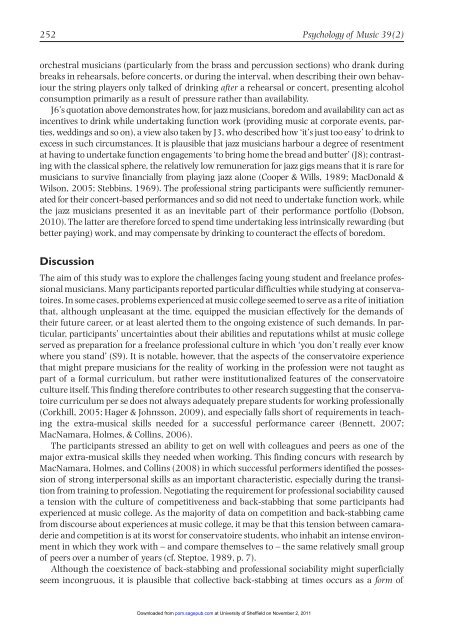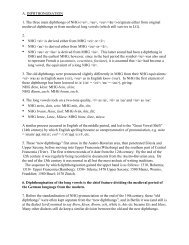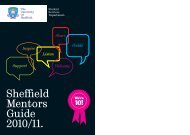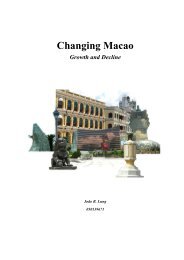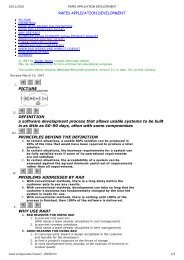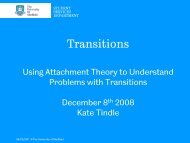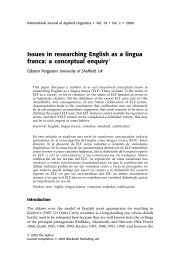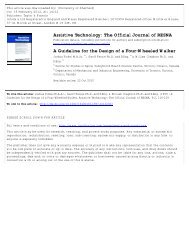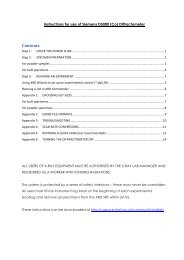Dobson, 2010.pdf - University of Sheffield
Dobson, 2010.pdf - University of Sheffield
Dobson, 2010.pdf - University of Sheffield
Create successful ePaper yourself
Turn your PDF publications into a flip-book with our unique Google optimized e-Paper software.
252 Psychology <strong>of</strong> Music 39(2)<br />
orchestral musicians (particularly from the brass and percussion sections) who drank during<br />
breaks in rehearsals, before concerts, or during the interval, when describing their own behaviour<br />
the string players only talked <strong>of</strong> drinking after a rehearsal or concert, presenting alcohol<br />
consumption primarily as a result <strong>of</strong> pressure rather than availability.<br />
J6’s quotation above demonstrates how, for jazz musicians, boredom and availability can act as<br />
incentives to drink while undertaking function work (providing music at corporate events, parties,<br />
weddings and so on), a view also taken by J3, who described how ‘it’s just too easy’ to drink to<br />
excess in such circumstances. It is plausible that jazz musicians harbour a degree <strong>of</strong> resentment<br />
at having to undertake function engagements ‘to bring home the bread and butter’ (J8); contrasting<br />
with the classical sphere, the relatively low remuneration for jazz gigs means that it is rare for<br />
musicians to survive financially from playing jazz alone (Cooper & Wills, 1989; MacDonald &<br />
Wilson, 2005; Stebbins, 1969). The pr<strong>of</strong>essional string participants were sufficiently remunerated<br />
for their concert-based performances and so did not need to undertake function work, while<br />
the jazz musicians presented it as an inevitable part <strong>of</strong> their performance portfolio (<strong>Dobson</strong>,<br />
2010). The latter are therefore forced to spend time undertaking less intrinsically rewarding (but<br />
better paying) work, and may compensate by drinking to counteract the effects <strong>of</strong> boredom.<br />
Discussion<br />
The aim <strong>of</strong> this study was to explore the challenges facing young student and freelance pr<strong>of</strong>essional<br />
musicians. Many participants reported particular difficulties while studying at conservatoires.<br />
In some cases, problems experienced at music college seemed to serve as a rite <strong>of</strong> initiation<br />
that, although unpleasant at the time, equipped the musician effectively for the demands <strong>of</strong><br />
their future career, or at least alerted them to the ongoing existence <strong>of</strong> such demands. In particular,<br />
participants’ uncertainties about their abilities and reputations whilst at music college<br />
served as preparation for a freelance pr<strong>of</strong>essional culture in which ‘you don’t really ever know<br />
where you stand’ (S9). It is notable, however, that the aspects <strong>of</strong> the conservatoire experience<br />
that might prepare musicians for the reality <strong>of</strong> working in the pr<strong>of</strong>ession were not taught as<br />
part <strong>of</strong> a formal curriculum, but rather were institutionalized features <strong>of</strong> the conservatoire<br />
culture itself. This finding therefore contributes to other research suggesting that the conservatoire<br />
curriculum per se does not always adequately prepare students for working pr<strong>of</strong>essionally<br />
(Corkhill, 2005; Hager & Johnsson, 2009), and especially falls short <strong>of</strong> requirements in teaching<br />
the extra-musical skills needed for a successful performance career (Bennett, 2007;<br />
MacNamara, Holmes, & Collins, 2006).<br />
The participants stressed an ability to get on well with colleagues and peers as one <strong>of</strong> the<br />
major extra-musical skills they needed when working. This finding concurs with research by<br />
MacNamara, Holmes, and Collins (2008) in which successful performers identified the possession<br />
<strong>of</strong> strong interpersonal skills as an important characteristic, especially during the transition<br />
from training to pr<strong>of</strong>ession. Negotiating the requirement for pr<strong>of</strong>essional sociability caused<br />
a tension with the culture <strong>of</strong> competitiveness and back-stabbing that some participants had<br />
experienced at music college. As the majority <strong>of</strong> data on competition and back-stabbing came<br />
from discourse about experiences at music college, it may be that this tension between camaraderie<br />
and competition is at its worst for conservatoire students, who inhabit an intense environment<br />
in which they work with – and compare themselves to – the same relatively small group<br />
<strong>of</strong> peers over a number <strong>of</strong> years (cf. Steptoe, 1989, p. 7).<br />
Although the coexistence <strong>of</strong> back-stabbing and pr<strong>of</strong>essional sociability might superficially<br />
seem incongruous, it is plausible that collective back-stabbing at times occurs as a form <strong>of</strong><br />
Downloaded from<br />
pom.sagepub.com at <strong>University</strong> <strong>of</strong> <strong>Sheffield</strong> on November 2, 2011


